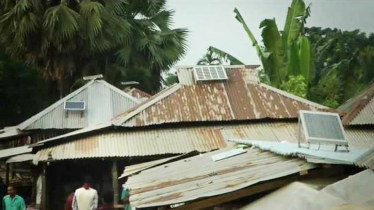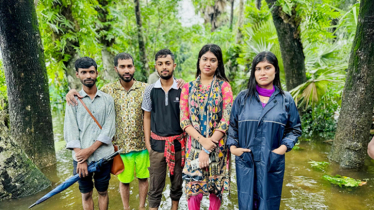
Photo : Collected
The nation will observe the 47th death anniversary of National Poet Kazi Nazrul Islam today (Sunday, 27 August). Unanimously revered as the ‘Rebel Poet’ - Kazi Nazrul Islam is considered a pioneer for his enormous contributions to Bengali literature.
Marking his 47th death anniversary, different organisations and institutions will organize multiple programmes throughout the day commemorating the life and works of the great poet, Dhaka University teachers, students, officials and employees will gather at the Aparajeyo Bangla in Kala Bhavan premises alongside DU vice-chancellor Professor Dr Akhtaruzzaman on Sunday at 6:15 am.
From there, they will visit the poet's tomb with a procession, offer wreaths and recite Fateha. Bangladesh Awami League will also gather at the poet’s tomb with a procession and prayer session at the graveyard of Nazrul at 7am.
Cultural institution Chhayanaut will organise a special cultural tribute programme at its auditorium in Dhanmondi at 7pm. The event will be simultaneously broadcasted on its Facebook group and YouTube channel.
Several television channels including Bangladesh Television (BTV), radio stations including Bangladesh Betar and online platforms will broadcast special programmes commemorating the life and works of the national poet.
Kazi Nazrul Islam, widely revered for his revolutionary and spectacular literary works in the then-Indian subcontinent, was born in Churulia village of Bardhawan in West Bengal, India, in 1899.
Nazrul had a brief 21-year literary career, during which he produced 2,600 songs, 600 poems, three books, and 43 essays, according to the Kabi Nazrul Institute.
In his early childhood, he had to work as a caretaker and as a muezzin in a mosque to support his family when his father passed away. He was forced to leave school at age nine in order to work for a professional "Leto" song team in Churulia, West Bengal.
While working with the group, he became familiar with Bangla and Sanskrit literature. A year later, he went back to school and enrolled at Matharun English School, but due to his financial hardship, he dropped out once more in Class VI.
After some time, police officer Kazi Rafizullah took him under his wing and enrolled him in Class VII at Darirampur School near his house in Trishal, Mymensingh.
Within a few years of beginning his military service in the British Army in 1917, Nazrul embarked on his literary career. He wrote his cult classic poetry "Bidrohi" (The Rebel) in 1921 and founded "Dhumketu" (The Comet), a monthly journal, in 1922.
Due to his frequent nationalist involvement in the Indian Independence Movement, Nazrul found himself in the clutches of colonial British authorities. He wrote the "Rajbandir Jabanbandi" (Deposition of a Political Prisoner) while he was incarcerated.
His works later inspired the Bangladesh Liberation War in 1971, and his poems inspired many Bengali netizens and nationalists to revolt against the oppression of Pakistan.
Freedom, humanity, love, and revolution are recurring themes throughout Nazrul's remarkable literary creations. He was against radicalism and all sorts of caste, gender, and religious prejudice.
Nazrul also published short stories, novels, and essays, although his songs and poems have received the most praise from critics. He is renowned for his liberal use of Arabic and Persian terms in his writings and for popularizing Bengali ghazal melodies.
He invented his own musical genre known as "Nazrul Geeti," which consists of almost 4,000 songs he penned and composed the music for, many of which were released on vinyl and HMV records.
When Nazrul was 43 years old and suffering from an unidentified illness, he started to lose his voice and his memory in 1942. His condition was later discovered to be "Pick's disease," a rare and fatal neurodegenerative disease, by a medical team in Vienna.
At the invitation of the Bangladeshi government and then President and the Father of the Nation Bangabandhu Sheikh Mujibur Rahman, Nazrul's family migrated to Bangladesh and settled in Dhaka in 1972. The government of Bangladesh conferred upon him the status of "national poet" in the same year.
He was awarded the honorary DLitt by Dhaka University in 1974 and received the Ekushey Padak in 1976, for his legendary contribution to Bangla literature and culture,
On August 27, 1976, the rebel poet breathed his last in Dhaka and was buried next to a mosque at the Dhaka University campus, fulfilling a wish he had made in one of his poems.
TDM/SD








